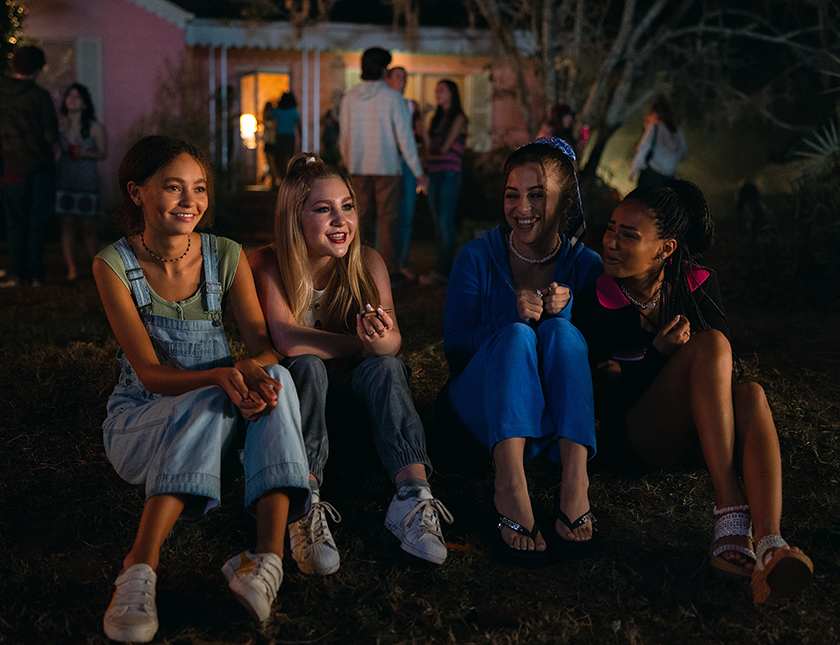The semi-autobiographical Suncoast is a charming, bittersweet coming-of-age film with a breakout performance from Nico Parker.
Motorola Razr flip phones, Destiny’s Child posters on the wall and Pussycat Dolls blasting out of car radios; 2005 is in full swing for the 17 year old protagonist of Suncoast, Doris (Nico Parker). The young Doris, named after her deceased grandmother, is basically invisible to her peers and her mother Kristine (Laura Linney). Doris has the demeanor of a dormouse, too shy to engage with her smoking, drinking, and driving classmates, and her mother Kristine is blinkered to Doris’s life in favor of her slowly dying son Max (Cree Kawa). Max has a form of brain cancer and is admitted to Suncoast Hospice so he can die peacefully.
The obsessive Kristine, whom Linney plays as a Karen-archetype stuck in a spiral of grief, begins spending nights at the hospice. Taking this as a chance to finally have some independence away from her controlling mother, Doris invites a group of teens from her class to use her house as a central location to party. As she navigates this new found friendship group and the impending death of her brother, Doris must find a balance between that grief and her own autonomy against a mother who’s struggling to adjust.
While there’s nothing particularly new in the framework of the charming coming-of-age, writer-director Laura Chinn brings Suncoast together with the strength and confidence of someone highly engaged with the story. The deeply personal story never feels like it’s masquerading, or taking swings that it knows will elicit reactions. The tone and structure of the film is reminiscent of Dayton and Faris’s Little Miss Sunshine, a similar indie film where conflict happens in small bursts but never finds itself overwhelming the narrative for dramatic value.

Chinn refrains from making the clichés in the script an unpalatable experience by executing them with small changes. The parties that Doris throws are less of the bombastic keg rager with hundreds in attendances that they’re often shown as, and more of a natural, reserved and accurate portrayal of adolescent civil disobedience. The friends that Doris makes have a refreshing sense of morality to them that still works regardless of their peer pressure attempts, and aren’t shown to be the plastic paradigm of teenage representation. This is especially shown in Doris’s interactions with Brittany (Ella Anderson), who is seen calling out the catty behavior of her friends multiple times.
Notoriously, media featuring high school students often get actors to play characters much younger than themselves; in HBO teen drama Euphoria, 27-year-old Hollywood star Zendaya plays a 17-year old. Forgoing this pattern, Suncoast casts the group of friends relatively accurately, each of them having enough of that baby-faced sensibility about them to help Suncoast feel sincere and immersive.
In 1990, Florida resident Terri Schiavo fell into a persistent vegetative state. 15 years later, on March 31st 2005, she died after the removal of her feeding tube. Her husband’s decision sparked nationwide debate and outrage. This infamous case backdrops Suncoast, the semi-autobiographical story of Chinn. At first glance, creating a story around the real life tragedy of Schiavo’s passing could have made this feel inauthentic, as if Chinn were wielding the case as curtain dressing for the growth of a character running parallel to Schiavo’s story. However, Chinn’s brother Max, to whom the film is dedicated, was moved into Suncoast Hospice at the same time as Schiavo.
In her director’s statement, Chinn says that “although most of the details are invented, all the emotions are autobiographical”. That the lives of Chinn and Schiavo actually intersected lends itself to keeping this story, which could have been seen as quite disrespectful, rooted in real and genuine emotions.
However, the case of Terri Schiavo was one that caused huge uproar, shown in Suncoast by the religious zealots protesting outside the hospice. The emotions around the case ran high, and was a political talking point for numerous years, eventually passing Terri’s Law, a governmental bill that allowed for the withdrawal of life-sustaining measures in specific circumstances. That Suncoast has no interest in discussing this makes the film feel a little muted and politically defanged.
During her time visiting her brother at Suncoast, Doris makes friends with Paul (Woody Harrelson), one of the evangelist zealots protesting. Chinn does too little with the character as Harrelson sleep-walks through the film, thinly existing as a sounding board to help Doris work through her angsty teenage feelings about her brother’s eventual passing. While it’s refreshing not to see a caricature of a protestor, that Paul’s character engages on the periphery of the film lessens the impact and growth we see from Doris.
Suncoast risks being a bit too slight, but with Chinn’s intimate writing, it consistently engages and delights. Between the script that is laced with sweet humor, shocking moments like that of Kristine forgetting about Doris, and a phenomenal breakout performance from young Nico Parker, Suncoast has the ability to evoke strong emotions. Chinn’s film is the type of warm filmmaking that can melt the coldest of hearts.
Suncoast is now available to stream on Hulu.

